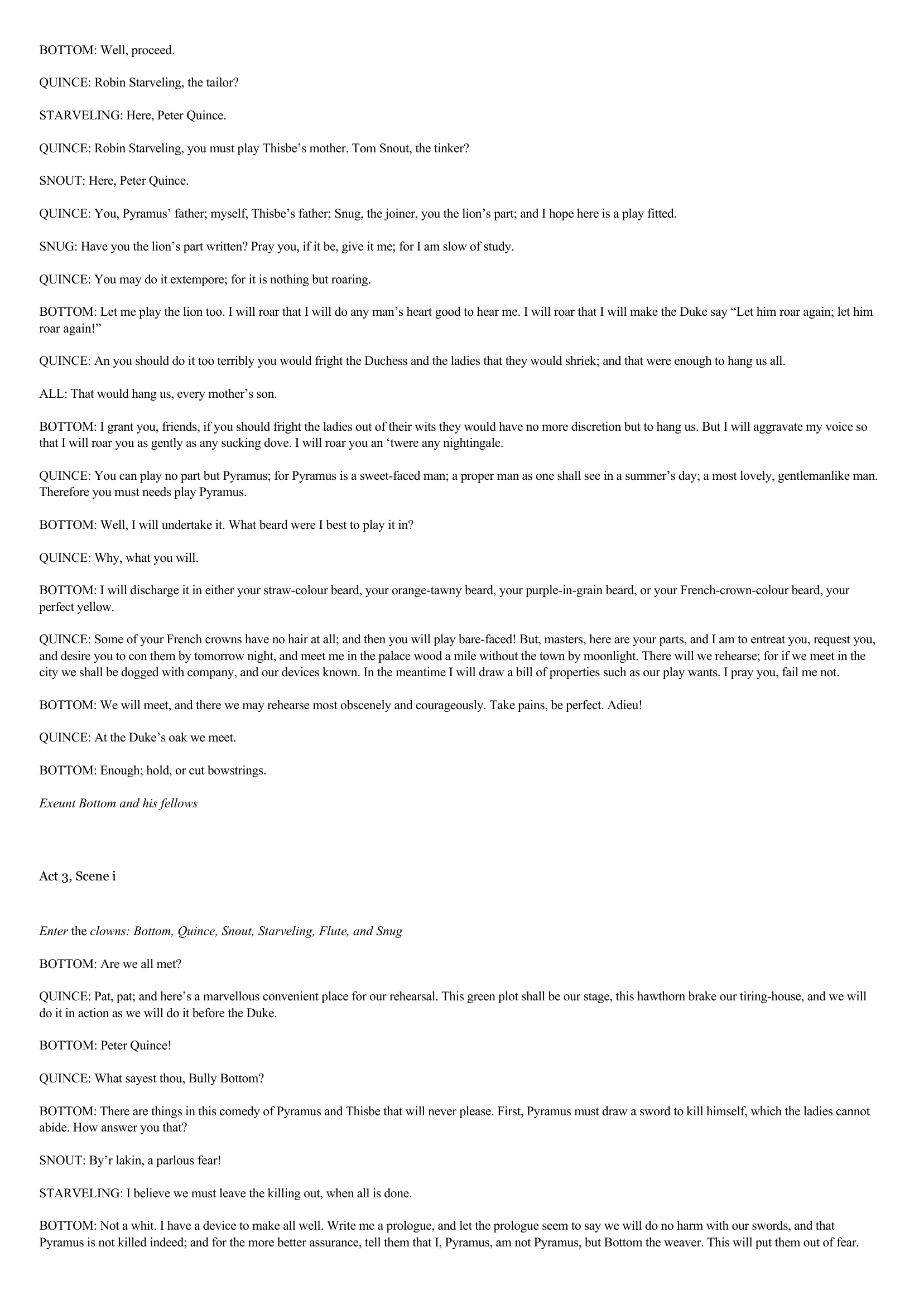Excerpt from A Midsummer Night's Dream - anthology.
Publié le 12/05/2013

Extrait du document
«
BOTTOM: Well, proceed.
QUINCE: Robin Starveling, the tailor?
STARVELING: Here, Peter Quince.
QUINCE: Robin Starveling, you must play Thisbe’s mother.
Tom Snout, the tinker?
SNOUT: Here, Peter Quince.
QUINCE: You, Pyramus’ father; myself, Thisbe’s father; Snug, the joiner, you the lion’s part; and I hope here is a play fitted.
SNUG: Have you the lion’s part written? Pray you, if it be, give it me; for I am slow of study.
QUINCE: You may do it extempore; for it is nothing but roaring.
BOTTOM: Let me play the lion too.
I will roar that I will do any man’s heart good to hear me.
I will roar that I will make the Duke say “Let him roar again; let himroar again!”
QUINCE: An you should do it too terribly you would fright the Duchess and the ladies that they would shriek; and that were enough to hang us all.
ALL: That would hang us, every mother’s son.
BOTTOM: I grant you, friends, if you should fright the ladies out of their wits they would have no more discretion but to hang us.
But I will aggravate my voice sothat I will roar you as gently as any sucking dove.
I will roar you an ‘twere any nightingale.
QUINCE: You can play no part but Pyramus; for Pyramus is a sweet-faced man; a proper man as one shall see in a summer’s day; a most lovely, gentlemanlike man.Therefore you must needs play Pyramus.
BOTTOM: Well, I will undertake it.
What beard were I best to play it in?
QUINCE: Why, what you will.
BOTTOM: I will discharge it in either your straw-colour beard, your orange-tawny beard, your purple-in-grain beard, or your French-crown-colour beard, yourperfect yellow.
QUINCE: Some of your French crowns have no hair at all; and then you will play bare-faced! But, masters, here are your parts, and I am to entreat you, request you,and desire you to con them by tomorrow night, and meet me in the palace wood a mile without the town by moonlight.
There will we rehearse; for if we meet in thecity we shall be dogged with company, and our devices known.
In the meantime I will draw a bill of properties such as our play wants.
I pray you, fail me not.
BOTTOM: We will meet, and there we may rehearse most obscenely and courageously.
Take pains, be perfect.
Adieu!
QUINCE: At the Duke’s oak we meet.
BOTTOM: Enough; hold, or cut bowstrings.
Exeunt Bottom and his fellows
Act 3, Scene i
Enter the clowns: Bottom, Quince, Snout, Starveling, Flute, and Snug
BOTTOM: Are we all met?
QUINCE: Pat, pat; and here’s a marvellous convenient place for our rehearsal.
This green plot shall be our stage, this hawthorn brake our tiring-house, and we willdo it in action as we will do it before the Duke.
BOTTOM: Peter Quince!
QUINCE: What sayest thou, Bully Bottom?
BOTTOM: There are things in this comedy of Pyramus and Thisbe that will never please.
First, Pyramus must draw a sword to kill himself, which the ladies cannotabide.
How answer you that?
SNOUT: By’r lakin, a parlous fear!
STARVELING: I believe we must leave the killing out, when all is done.
BOTTOM: Not a whit.
I have a device to make all well.
Write me a prologue, and let the prologue seem to say we will do no harm with our swords, and thatPyramus is not killed indeed; and for the more better assurance, tell them that I, Pyramus, am not Pyramus, but Bottom the weaver.
This will put them out of fear..
»
↓↓↓ APERÇU DU DOCUMENT ↓↓↓
Liens utiles
- Excerpt from Twelfth Night - anthology.
- Excerpt from Troilus and Cressida - anthology.
- Excerpt from Titus Andronicus - anthology.
- Excerpt from Timon of Athens - anthology.
- Excerpt from The Winter's Tale - anthology.


